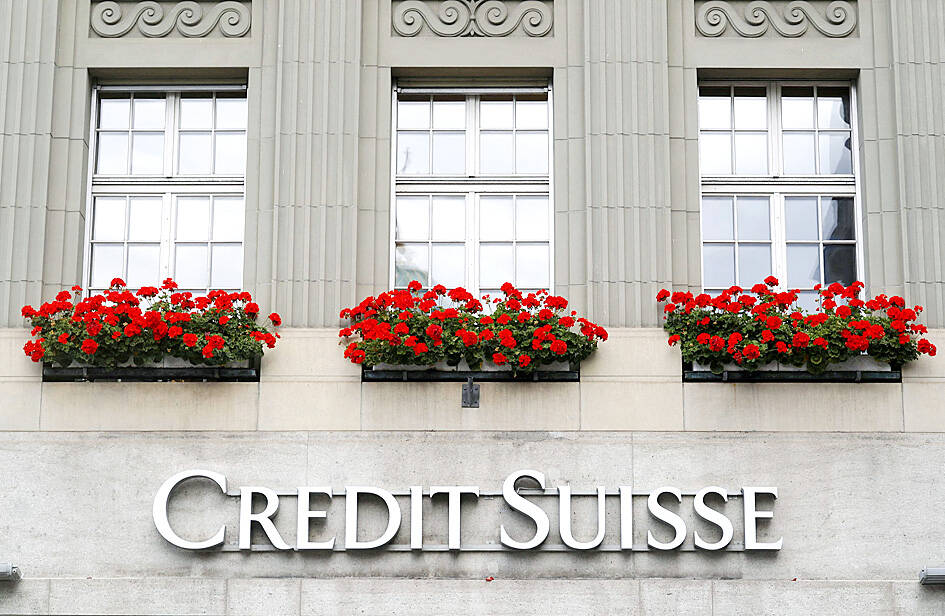Credit Suisse Group AG yesterday hit a fresh record low after attempts to reassure markets on its financial stability only added to the sense of turmoil surrounding the troubled Swiss bank.
Its shares dropped as much as 12 percent in Zurich trading to 3.52 Swiss francs. The bank has lost about 60 percent of its market value just this year alone and is on track for the biggest ever annual drop in its history.
Credit Suisse chief executive officer Ulrich Koerner had sought to calm employees and the markets over the weekend after the stock touched a record low and credit default swaps climbed last week.

Photo: Reuters
While touting the bank’s capital levels and liquidity, he acknowledged that the firm was facing a “critical moment” as it worked toward its latest overhaul plans.
He also told employees that he would be sending them a regular update until the firm announces the new strategic plan on Oct. 27 because of the speculation surrounding the lender.
At the same time, Credit Suisse again sent around talking points to executives dealing with clients who brought up the credit default swaps, people with knowledge of the matter said.
The cost of insuring the firm’s bonds against default climbed about 15 percent last week to levels not seen since 2009. Some clients have used the rise in the bank’s credit default swaps this year to ask questions, negotiate prices or use competitors, the people said, asking to remain anonymous discussing confidential conversations.
Credit Suisse declined to comment via a company spokesman.
Koerner, named chief executive in late July, has had to deal with market speculation, banker exits and capital doubts as he seeks to set a path forward.
The lender is finalizing plans that would likely see sweeping changes to its investment bank and might include cutting thousands of jobs over a number of years, Bloomberg has reported.
Credit Suisse’s market capitalization has dropped to about SF9.5 billion (US$9.6 billion), meaning any share sale would be highly dilutive to longtime holders. The market value was above SF30 billion as recently as March last year.
Bank executives have said that the firm’s 13.5 percent CET1 capital ratio on June 30 was in the middle of the planned range of 13 to 14 percent for this year.
Last year’s annual report said the bank’s international regulatory minimum ratio was 8 percent, while Swiss authorities required a higher level of about 10 percent.
The five-year credit default swaps price of about 250 basis points is up from about 55 basis points at the start of the year and is near their highest on record. While those levels are still far from distressed and are part of a broad market sell-off, they signify deteriorating perceptions of creditworthiness for the scandal-hit bank.
Credit Suisse last week said that it is working on possible asset and business sales as part of its strategic plan which is to be unveiled at the end of this month. The bank is exploring deals to sell its securitized products trading unit, is weighing the sale of its Latin American wealth management operations excluding Brazil, and is considering reviving the First Boston brand name, Bloomberg has reported.

Intel Corp chief executive officer Lip-Bu Tan (陳立武) is expected to meet with Taiwanese suppliers next month in conjunction with the opening of the Computex Taipei trade show, supply chain sources said on Monday. The visit, the first for Tan to Taiwan since assuming his new post last month, would be aimed at enhancing Intel’s ties with suppliers in Taiwan as he attempts to help turn around the struggling US chipmaker, the sources said. Tan is to hold a banquet to celebrate Intel’s 40-year presence in Taiwan before Computex opens on May 20 and invite dozens of Taiwanese suppliers to exchange views

Application-specific integrated circuit designer Faraday Technology Corp (智原) yesterday said that although revenue this quarter would decline 30 percent from last quarter, it retained its full-year forecast of revenue growth of 100 percent. The company attributed the quarterly drop to a slowdown in customers’ production of chips using Faraday’s advanced packaging technology. The company is still confident about its revenue growth this year, given its strong “design-win” — or the projects it won to help customers design their chips, Faraday president Steve Wang (王國雍) told an online earnings conference. “The design-win this year is better than we expected. We believe we will win

Chizuko Kimura has become the first female sushi chef in the world to win a Michelin star, fulfilling a promise she made to her dying husband to continue his legacy. The 54-year-old Japanese chef regained the Michelin star her late husband, Shunei Kimura, won three years ago for their Sushi Shunei restaurant in Paris. For Shunei Kimura, the star was a dream come true. However, the joy was short-lived. He died from cancer just three months later in June 2022. He was 65. The following year, the restaurant in the heart of Montmartre lost its star rating. Chizuko Kimura insisted that the new star is still down

While China’s leaders use their economic and political might to fight US President Donald Trump’s trade war “to the end,” its army of social media soldiers are embarking on a more humorous campaign online. Trump’s tariff blitz has seen Washington and Beijing impose eye-watering duties on imports from the other, fanning a standoff between the economic superpowers that has sparked global recession fears and sent markets into a tailspin. Trump says his policy is a response to years of being “ripped off” by other countries and aims to bring manufacturing to the US, forcing companies to employ US workers. However, China’s online warriors